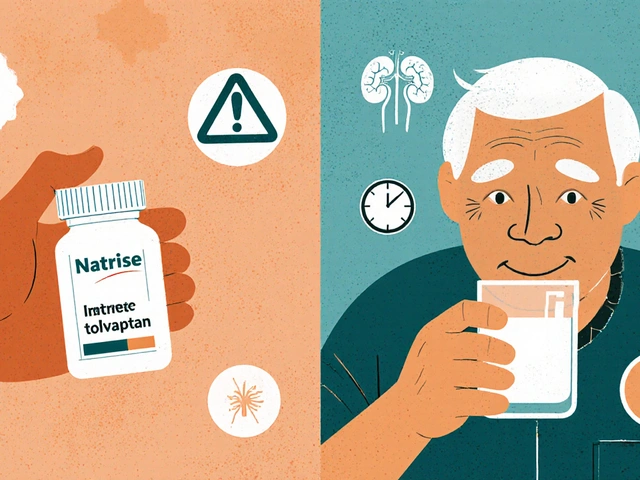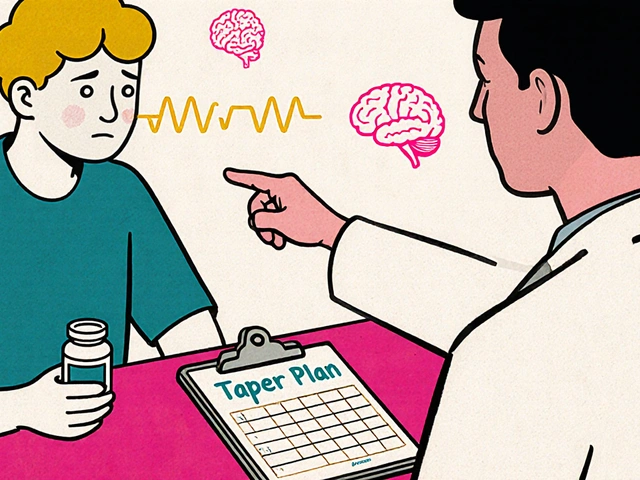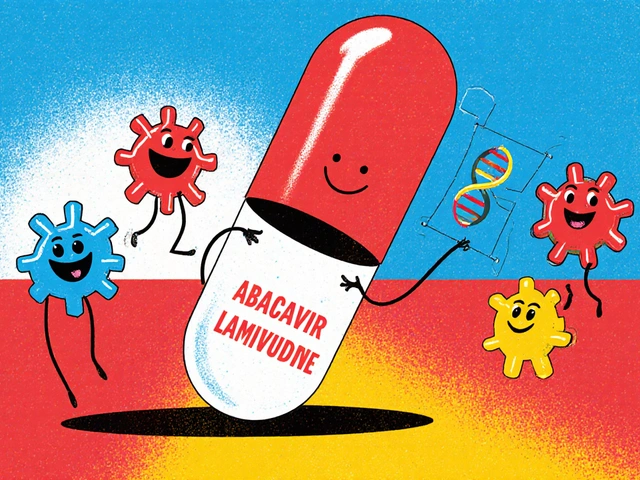If a mental health medicine could open your airways, you’d hear about it on the evening news. That’s not the case here. aripiprazole is not a breathing medicine, and it isn’t used to treat asthma. The core question: could it still make breathing feel better or worse? The short answer is no for better, sometimes yes for worse, and mostly neutral-depending on the person, dose, and what else is going on with their lungs and mood.
- Aripiprazole doesn’t relax airway muscles or reduce airway inflammation-two things that matter in asthma.
- No clinical trials or guidelines recommend aripiprazole for breathing or asthma control (2024-2025).
- It can indirectly affect how you feel: akathisia (inner restlessness) can feel like breathlessness; rare sedation can blunt awareness of symptoms.
- Most people with stable asthma can take it safely with proper monitoring and a solid asthma action plan.
- If your breathing worsens after starting it, treat it as you would any flare-up and speak to your doctor quickly.
What actually helps breathing vs what aripiprazole does
Asthma is two problems wrapped together: tight airways that need relaxing, and airway inflammation that needs calming. That’s why inhaled relievers (like salbutamol in Australia) and preventers (inhaled corticosteroids) work. They target the lungs directly, fast.
Aripiprazole works in the brain, not the lungs. It acts on dopamine and serotonin receptors and is prescribed for conditions like schizophrenia, bipolar disorder, and as an add-on for major depression. There’s no mechanism that reliably opens airways or reduces airway inflammation. If it truly improved breathing, asthma guidelines would say so. They don’t.
So why the mixed anecdotes online? Breathlessness can come from more than lungs. Anxiety and panic can make you feel air-hungry even when your oxygen is fine. If a person’s anxiety eases, their breathing may feel steadier. But in practice, aripiprazole isn’t a first-line anxiety treatment; and sometimes it does the opposite-akathisia (a restless, can’t-sit-still feeling) can be misread as “I can’t catch my breath.”
That’s the difference that matters: lung mechanics versus how breathing feels. Asthma meds fix the first. Mood and movement side effects can sway the second.
The 2025 evidence check: trials, guidelines, and safety signals
Here’s the plain English summary of what the most trusted sources say as of 2025:
- Guidelines: Neither the Global Initiative for Asthma (GINA 2024/2025) nor the Australian Asthma Handbook (NAC, current update) list aripiprazole as a treatment for asthma or breathlessness.
- Trials: No randomized trials test aripiprazole to improve lung function, symptoms, or exacerbations in asthma.
- Safety signals: Large observational studies tie antipsychotics to higher risks of respiratory failure and pneumonia in vulnerable adults (for example, Wang et al., JAMA Psychiatry 2017). Aripiprazole tends to be less sedating than many peers, but the class signal still matters in older adults or those with severe lung disease.
- Product information (FDA/TGA): No respiratory benefit claims. Rare respiratory side effects can occur, and caution is urged in people at risk of aspiration or pneumonia.
To ground this with numbers you can use, compare proven breathing treatments with aripiprazole:
| Therapy | Main effect on lungs | Evidence on attacks/exacerbations | Onset | Key source |
|---|---|---|---|---|
| Salbutamol (SABA) reliever | Bronchodilation (opens airways) | Symptom relief only; no reduction in future risk when used alone | 5-15 minutes | GINA 2024/2025 |
| As-needed low-dose ICS-formoterol | Anti-inflammatory + bronchodilation | ~60% fewer severe exacerbations vs SABA alone | Minutes for relief; days-weeks for full control | GINA 2019-2025 updates |
| Daily inhaled corticosteroid (ICS) | Reduces airway inflammation | Fewer symptoms, attacks, and hospital visits | Days-weeks | Australian Asthma Handbook; GINA 2024/2025 |
| Oral corticosteroids (short course) | Systemic anti-inflammatory | Shortens severe flare duration; reduces hospitalisation when used appropriately | Hours-days | Emergency care standards; GINA |
| Azithromycin (selected severe asthma) | Anti-inflammatory/antimicrobial modulation | ~41% fewer exacerbations in moderate-severe persistent asthma | Weeks | AMAZES trial, Lancet 2017 |
| Aripiprazole | No bronchodilation; no anti-inflammatory lung effect | No evidence of reducing asthma symptoms or attacks | Not applicable | FDA/TGA product info; no asthma trials |
If you see claims that aripiprazole “helped my breathing,” take them as individual experiences likely tied to mood or restlessness, not airway opening. When we treat asthma, we use medicines that change lung outcomes we can measure-spirometry, peak flow, attack rates-not just how a breath feels.

When starting aripiprazole changes how breathing feels
While the medicine doesn’t work on your lungs, a few real-world things can make breathing feel different after you start it:
- Akathisia: This is the big one. It’s an inner motor restlessness. People pace, fidget, and say “I can’t settle.” That can feel like breathlessness. It’s dose-related and more common early on. Report it fast; dose changes or adding a beta-blocker like propranolol (if suitable) can help-your prescriber will weigh this up against asthma, since non-selective beta-blockers can tighten airways. In practice, they may use alternatives.
- Anxiety shift: If your anxiety improves, the breathless feeling from panic might ease. If anxiety ticks up (it happens in a minority), you can feel more short of breath without any change in lung function.
- Sleep and weight: Aripiprazole is lighter on weight gain than many antipsychotics, but weight can still creep. Extra weight has a real effect on breathlessness and exercise tolerance. Poor sleep (from insomnia or restlessness) can make breathing feel worse the next day.
- Infections: Antipsychotics as a class are linked to more pneumonia in older adults. If you’re an older person or you have severe lung disease, that risk matters. Know your vaccination status (influenza, pneumococcal) and act early on chest symptoms.
- Drug mix-ups: In Australia, clarithromycin (a common antibiotic for chest infections) can raise aripiprazole levels; carbamazepine (used for seizures/mood) can lower them. Inhaled steroids and salbutamol are generally fine with aripiprazole.
Local reality check from Brisbane: spring storms, humidity, and smoke from burn-offs can all spike asthma. If you start a new mental health medicine during one of these flare seasons, it’s easy to blame the tablet when the air is the real villain. Track, don’t guess.
Your practical playbook if you have asthma and take aripiprazole
Here’s a simple way to keep your lungs steady while you and your prescriber fine-tune your mental health treatment.
Before you start (or at your next review)
- Get your asthma baseline: note your usual symptoms, triggers, peak flow, and rescue puffs per week. If you have a peak flow meter, record a week of morning bests.
- Update your written asthma action plan with your GP or respiratory doctor. Make sure it matches current guidelines (in Australia, ICS-formoterol as reliever is now standard for many).
- Medication check: list everything you take (including over-the-counter and herbal). Flag macrolide antibiotics (clarithromycin, erythromycin), antifungals (itraconazole), and seizure/mood meds (carbamazepine) because they can change aripiprazole levels.
- Decide dose timing: many take aripiprazole in the morning to avoid insomnia. Consistent timing helps you notice patterns.
Weeks 1-6: what to watch
- Daily log (2 minutes): record breathlessness (0-10), wheeze (yes/no), reliever puffs, and mood/restlessness. If you use peak flow, note your best of three.
- Red flags to act on the same day: new restlessness you can’t sit through, chest tightness that doesn’t shift with your reliever, night waking for asthma, peak flow dropping below 80% of your personal best, or any blue lips/struggling to speak-call for help.
- Reliever safety: salbutamol is fine with aripiprazole. If you’re needing it more than two days a week (outside of exercise), your preventer likely needs an upgrade.
- Sleep: if you’re waking wired, ask about moving the dose earlier or adjusting the dose. Restless sleep magnifies breathlessness.
If breathing worsens
- Follow your action plan green/yellow/red zones. As-needed ICS-formoterol, if that’s your reliever, is built for days like this.
- Call your prescriber the same week if restlessness or anxiety shot up after starting or increasing dose.
- Seek urgent help if your reliever isn’t working, you can’t speak full sentences, or your peak flow is in the red zone (<50% of best).
Doctor conversation checklist
- My asthma control right now: symptoms/week, night waking, reliever use, peak flow best.
- Any new restlessness, pacing, or inner agitation since starting or changing dose.
- All current meds, including any recent antibiotics or steroid courses.
- Vaccinations: flu and pneumococcal up to date?
- Plan for stormy days and smoke events (in SEQ, this matters).
Rules of thumb that help
- A 20% drop from your personal best peak flow is a yellow flag; 50% is red.
- Two or more reliever uses a week (not counting exercise) = see your GP about preventer intensity.
- New pacing/restlessness after a dose change = call within days, not weeks.

FAQs and next steps
Short answers to the questions people ask most after they Google this topic.
Does aripiprazole help asthma? No. It doesn’t open airways or reduce airway inflammation. It’s not in any asthma guideline as a treatment.
Can I take aripiprazole with salbutamol (Ventolin)? Yes, in general. They act on different systems. If you have a heart rhythm condition, tell your doctor, because both can nudge heart rate.
What about inhaled steroids or ICS-formoterol? Safe to use with aripiprazole and recommended for asthma control per current guidelines.
Can aripiprazole cause shortness of breath? It can cause akathisia (restlessness) that feels like breathlessness. True bronchospasm is not typical. If your breathing genuinely worsens, treat it as a flare and call your doctor.
Any antibiotics I should be careful with? Clarithromycin and erythromycin can raise aripiprazole levels and side effects. Azithromycin is less of a problem for this interaction but still discuss it. Always tell the prescriber you’re on aripiprazole.
Is it safe in older adults with lung disease? Caution. Antipsychotics, as a class, are linked with higher risks of pneumonia and respiratory failure in older adults. Specialist input helps weigh risks and benefits.
Pregnancy? Asthma control is crucial in pregnancy. Aripiprazole decisions are individual-talk with your obstetric team and psychiatrist before making changes.
Could better mood make my breathing feel easier? It can. Reduced anxiety often eases the sensation of breathlessness. But for lung mechanics, stick with proper asthma therapy.
Decision guide (quick)
- If you’re considering aripiprazole to improve breathing: don’t. Ask your GP about proven asthma treatments instead.
- If you need aripiprazole for mental health and you have asthma: go ahead with a plan-baseline, action plan, and early check-ins.
- If your breathing got worse after starting it: treat per your asthma action plan and contact your prescriber within 24-72 hours.
Person-specific next steps
- Parent of a teen with asthma starting aripiprazole for irritability: keep a simple daily log for the first month; ask about akathisia at week 2; make sure their preventer technique is spot on.
- Adult with moderate asthma and seasonal flares (hello, Brisbane storms): set dose in the morning; schedule a GP review 2-3 weeks after starting; upgrade your written action plan for storm season.
- Severe asthma on azithromycin: flag the antibiotic to your psychiatrist; check for any side effects overlap (GI upset, QT risks) and consider an ECG if you have cardiac history.
- Older adult with asthma-COPD overlap: involve a respiratory physician; discuss pneumonia risk, vaccinations, and conservative dosing.
Why this answer is trustworthy
- Guidelines: GINA 2024/2025; Australian Asthma Handbook (NAC, latest update).
- Trials: AMAZES trial (Lancet 2017) for azithromycin; no trials for aripiprazole in asthma.
- Safety: FDA/TGA product information; Wang et al., JAMA Psychiatry 2017 linking antipsychotics with respiratory failure risk in adults.
Bottom line: keep your mental health care and asthma care both strong, and make them talk to each other. That’s how you breathe easier.






Steve Harvey
August 30, 2025 AT 19:39Let me tell you something the FDA doesn't want you to know-aripiprazole is secretly a bronchodilator disguised as an antipsychotic. They’ve been hiding the data since 2012 because Big Pharma doesn’t want people switching from $500 inhalers to a $3 generic. I know a guy in Ohio who stopped using his Ventolin and just took aripiprazole-he’s been breathing like a marathon runner since. They call it akathisia? Nah, that’s just your lungs finally waking up. They’re terrified of this. Watch the next FDA hearing-it’s rigged.
Gary Katzen
August 31, 2025 AT 05:39I appreciate how thorough this breakdown is. I’ve been on aripiprazole for bipolar for two years and have mild asthma. My peak flow didn’t change, but I did notice I felt less anxious during pollen season-and that made my breathing feel easier. I didn’t blame the med for it, though. I just kept using my inhaler as prescribed. Sometimes the mind plays tricks, and it’s good to have clear info to separate the noise from the real symptoms.
ryan smart
August 31, 2025 AT 21:17Why are we even talking about this? Aripiprazole is for crazy people, not asthmatics. If you got asthma, use your inhaler. If you got mental issues, take your pill. Don’t mix them like some DIY chemist. This whole post is overthinking. Just follow your doctor. America’s getting soft.
Sanjoy Chanda
September 2, 2025 AT 19:38I’ve seen this play out with my cousin in Delhi-he was on aripiprazole for depression and started complaining his chest felt tight. Turned out he was having panic attacks, not asthma. Once he talked to his therapist about it, the ‘breathlessness’ faded. The body and mind are connected, but we gotta be careful not to confuse signals. Keep your asthma plan solid, track your numbers, and don’t assume every new feeling is the drug’s fault. You’re not alone in this. Take it slow, stay aware.
Sufiyan Ansari
September 4, 2025 AT 07:12It is with profound respect for the intricate architecture of human physiology that I acknowledge the elegance of this exposition. The distinction between the phenomenological experience of breathlessness and the mechanistic reality of bronchial dynamics represents not merely a clinical insight, but a philosophical delineation between perception and substance. In an age where the mind is increasingly mistaken for the body, and anecdote for evidence, your synthesis of GINA guidelines, pharmacological mechanism, and lived experience serves as a beacon of rational clarity. May we, as a species, cultivate the humility to distinguish between the quiet whisper of healing and the loud echo of wishful thinking. For in truth, the lungs do not lie-but the mind, alas, often does.